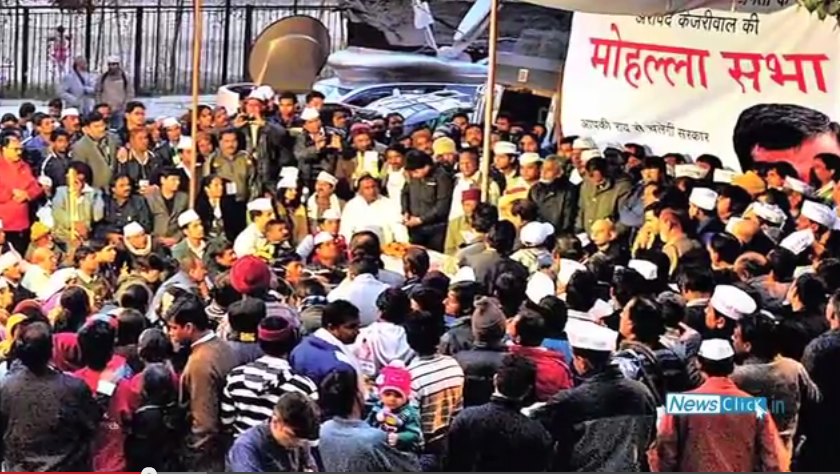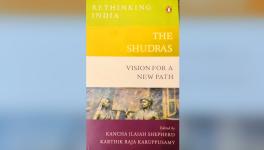AAP’s Broom Sweeps Delhi Clean
Newsclick Interviewed Shankar Raghuraman, Associate Editor Times of India on Delhi Assemble results where Aam Aadmi Party created history by winning more than 95 % of the seats. Shankar explains that Delhi directly comes under the BJP led Centre government, which was not able to fulfill its promises that it made in 2014 Lok Sabha Polls. While other states like Jharkhand, Haryana had seen anti-incumbency against the ruling congress, Delhi witnessed 49 days performance of AAP, which created an alternative in front of the public. Shankar believes that the rhetoric of the Modi government and their pro corporate policies led to this decimation. On the question of AAP as an alternative at the national level, Shankar feels that it currently would focus on Delhi as the issues on which it fought elections are mainly Delhi-centric and hence may not have that much impact at the national level.

Rough Transcript
Pranjal(PR): Hello and welcome to Newsclick. We have with us Shankar Raghuraman, Associate editor, Times of India. We are going to discuss Delhi Assembly elections with him. Hello Shankar. When we have seen that in 2014 BJP got such a huge majority in Lok Sabha polls successful win in Jharkhand, Maharashtra and Haryana why did they lose in Delhi?
Shankar Raghuraman(SR): the crucial difference is that in 2014 people were voting for Mr Modi and BJP on the basis of the promises being made, on the basis of hope that things will change from the situation under the UPA and second UPA government where you had a decade of jobless growth, where prices particularly food prices were extremely high for several years running. So that was a vote for change. It was a vote made of the basis of hopes and promises. Today when Delhi went for the polls 8 months and 9 months after the modi government, it is no longer voting on Mr Modi just on the basis of promises. There is an evaluation of how far the modi government has delivered on those promises and what these results show is that the evaluation clearly is negative on the delivery of the promises but there is also a positive component to this verdict. It is not a verdict merely against BJP and modi. It is a verdict for Arvind Kejriwal an AAP and that’s on the basis of what people saw of the AAP as a party, as a government for 49 days to reduce it to either or say that is it pro AAP or anti Modi; I think it is both.
PR: do you think its participatory democracy that AAP believes in? they did Mauhalla Sabhas everywhere, so does this have any role to play in this win?
SR: certainly. I think the feeling among people at large has been that they are completely excluded from the democratic process, that they have no say in what policies are formulated by government and which will make deep impact on their lives. You know whether there are things like “should subsidy for cooking gas come in the form of subsidized cylinders or should it come as cash in your bank account?” they are just preached to, they are told that this will be better for you and they have to like it or lump it. There is a deep sense of disempowerment in the over whelming majority of poor Indians in particular and yes the AAP’s method of doing politics does give them hope that we have a much greater say in how the government functions.
PR: we have seen in Delhi in last few months that there has been a communal tension going up in various parts. So is it defeat of Communal politics also?
SR: yes certainly, I mean if you look at the parts of the city where you would have expected to see communal tensions playing a role in the verdict Trilokpuri, where there were riots AAP has won comfortably in Trilokpuri, Bawana simmering tension has been there for quite some time again it is not a seat where AAP won last time but it has won on this occasion. So there is a rejection of that brand of politics. Also if you look at what happened on the eve of the elections when the Shahi Imam of the Jama Mazjid offered support to AAP and AAP promptly rejected it saying we do not believe in this kind of politics. We will not accept support from communal elements then contrasts that with Dera Saccha Sauda offering support to BJP and BJP quite willing accepted it; that also brought out quite clearly for people that these are two very different styles of politics.
PR: we have seen that though AAP has got votes across all sections, castes and gender of the society but their major vote bank has been oppressed and marginalized section of the society. This is what left has been trying to do since long. So is it a wake-up call for left like people are saying that this is the emergence of new left in India. So can we call AAP Left, left of the centre or what?
SR: well left of a centre is a delightfully vague term so it can certainly be applied to AAP and many others. Left in the traditional sense, I mean if you are using Left as some kind of Marxian or Marxist thought then obviously AAP does not fit into that paradigm because AAP doesn’t have a critic of capitalism per se, it doesn’t see capitalism itself as a problem. So anybody who has some concern in his heart for the poor cannot be characterized as Left. To that extent I don’t think AAP should be characterized as left. Is it a party that believes in a welfares program?, yes it does. I mean it was clear from some of the things that they did when they were in the government and some of the promises that they made. Is it a socio democratic type of a party? Yes I would say it is but to describe it as Left force would be incorrect but the other point you are making about in some sense this also highlights the failure of the left because it is precisely these sections of the society left should be finding as natural vote banks. Yes it is true, had the left been successful in implementing these programs, these sections should have been with left and not parties like AAP.
PR: we have seen in newspaper media reports, nobody is discussing congress. It is near to an end. So it is awakening or coming up of a new national level party? Can we see it like that?
SR: I would be hesitant to write off the congress nationally or to immediately see AAP as a national alternative to the BJP. It has, let us not forget that in the Lok Sabha polls for instance AAP made exactly this mistake. The fact that it did so well in its very first elections in Delhi in 2013 convinced it that it had a platform to launch itself nationally and with the exception of Punjab where it put up very good show. Nowhere else outside Delhi, it was able to do anything of significance. So I would be hesitant to so soon write of either the congress or see AAP as a national emerging force.
PR: so there could be formation of some national alliance between various sort of social democratic parties where they can come on an agenda to work against BJP or to form an alliance against BJP?
SR: it is possible but I am not so sure that AAP would be part of any such alliance. AAP has long along premised its politics on portraying itself as different from established political parties not just BJP and Congress. So to that extent it is difficult for AAP to enter into alliances with even parties which they might well have got in common with but I think in any case alliance formed purely for electoral reasons have very limited value and therefore very limited appeal to people.
PR: we have elections coming in Bihar and West Bengal. Do you think these elections are going to impact BJP in Bihar and the way it is growing in West Bengal?
SR: it could certainly have an impact. If nothing else it could at least have the impact of making the BJP cadre a lot less sure of itself then it has been so far. The aura of invincibility that was built up around modi and Amit Shah gave BJP cadre in every part of India a lot of moral boosting and the moral of a party organization always does make a difference. If AAP volunteers had not believed they would win these elections, then you wouldn’t have seen the kind of enthusiastic campaigning door to door canvassing that you saw. It was because they genuinely believed it and it happened. The same thing happens to any other political party. If BJP are now a lot less sure about how well their party is doing that will make a difference equally on the other side opposition to the BJP will feel or begin to feel completely disheartened. They had almost thrown their hands up that you know there is nothing we can do to stop this jaggernaut that will no longer be the case; parties will now believe that they can be defeated, that BJP can be defeated. So both these things make a difference and as I said there are factors in the Delhi election like questioning of whether the Modi government is delivering on its promises, there is no reason why those factors should be peculiar to Delhi. There are some other factors which are specifically for Delhi but factors of disillusionment on performance will cut across the country.
PR: we have seen that AAP is not a cadre based party it is a volunteer based party. People are coming here and working. So can we say it is development of a non political organization in a political structure?
SR: see I don’t know what you mean by saying the cadres are volunteers. I mean I suppose what you mean really is that they are not part of a formal structure. Yeah, there is sort of amorphous nature of the organization in AAP but as it grows it will have to evolve some structures. AAP’s structures may be different from the structures obtained by other parties but some kind of structure will come into place. In fact is already coming into place. The early notions of you know, that it’s a completely decentralized functioning no longer apply. To a large extent AAP has stopped pretending that everything is done after consultation with the ground. There are some decisions which are taken by the party leadership. They are no longer shy of admitting that there is such a thing as leadership but yeah it is still an evolving structure and it will take shape at exactly what time and what shape it takes is difficult to say at this point of time.
PR: that’s all the time we have for today. Thank you for giving us your time. Thank you for watching Newsclick.
Get the latest reports & analysis with people's perspective on Protests, movements & deep analytical videos, discussions of the current affairs in your Telegram app. Subscribe to NewsClick's Telegram channel & get Real-Time updates on stories, as they get published on our website.























